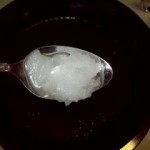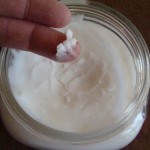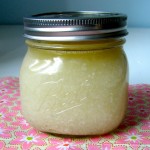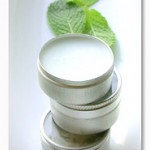Uses for Coconut Oil
Several of the people who left comments on the giveaway have asked variations of, “what the heck am I going to do with all that coconut oil if I win?”
That is an outstanding question, and we’re happy to help!
First off, I’d recommend putting about a quart of it into another container to make it easier to access in the kitchen. The gallon bucket isn’t enormously unwieldy, but it’s a touch inconvenient for everyday use.
Cooking is one of my favorite ways to use coconut oil, but it’s surely not the only way we use it. You won’t need to use it up right away, either; because of its inherent stability, it is slow to oxidize and, thus, resists rancidity for up to two years. This is largely due to its high saturated fat content. The oil will be good for at least one year after the expiration date.
Thankfully, “saturated fat” is no longer a naughty phrase. Those of us who have been around awhile have witnessed the low-fat, unsaturated fat, “heart-healthy” craze, which now seems like it’s about to teeter out of existence. The medical community is coming to realize those saturated fats are a heck of a lot healthier for us than the hydrogenated oils and poly-unsaturated nonsense.
This expeller-pressed coconut oil is from Tropical Traditions, where we purchase all of our coconut-based products. Their company website has excellent information about their methods and philosophy, as well as recipes and additional uses for their products. Personally, I use the following products from Tropical Traditions: Lavender Liquid Soap; Shampoo Bars; Insect Repellent, and others.
So! Without further ado, here’s my list of how coconut oil contributes to our household. There are many other ways to use it, as well – please feel free to share yours.
 Frying: Coconut oil is excellent for frying all manner of foods. It has a relatively light, neutral taste, which does not stand out against other ingredients. Coconut oil is very heat-stable, which makes it well-suited to methods of cooking at high temperatures, such as frying. It has a higher smoke point than olive oil, but will smoke after about 350 degrees Fahrenheit. Refined coconut oil (which we never use) has a much higher smoke point of 450 degrees Fahrenheit.
Frying: Coconut oil is excellent for frying all manner of foods. It has a relatively light, neutral taste, which does not stand out against other ingredients. Coconut oil is very heat-stable, which makes it well-suited to methods of cooking at high temperatures, such as frying. It has a higher smoke point than olive oil, but will smoke after about 350 degrees Fahrenheit. Refined coconut oil (which we never use) has a much higher smoke point of 450 degrees Fahrenheit.
 Deodorant: I haven’t used regular deodorant in years. Standard deodorants and anti-persperants contain all manner of toxic nastiness, including but not limited to: Aluminum, Disodium EDTA, and parabens. If you’re not convinced those are horrible things to put onto our skin, our bodies’ largest organ and a quick way for compounds to enter our bodies, do a quick Google search. You’ll be astounded.
Deodorant: I haven’t used regular deodorant in years. Standard deodorants and anti-persperants contain all manner of toxic nastiness, including but not limited to: Aluminum, Disodium EDTA, and parabens. If you’re not convinced those are horrible things to put onto our skin, our bodies’ largest organ and a quick way for compounds to enter our bodies, do a quick Google search. You’ll be astounded.
Coconut oil melts at temperatures above 75 degrees Fahrenheit, which means it will quickly melt, disperse, and absorb into our skin. Fortunately, in this case, it will only introduce healthy elements into our bodies.
There are a variety of ways to make coconut oil deodorant, and you can freely experiment to find one that works just right for you. I have very sensitive skin, so I have to reduce the standard about of baking soda one might see in recipes; my armpits were getting chafed raw by it (part of the reason baking soda is such a great cleaner is because it is highly-abrasive.) The purpose of baking soda in deodorant is to absorb odors, so reducing it may also reduce the efficacy of the final product.
The small amount used per application means this 1/2 pint will last from six months up to a year! That’s a lot of bang for your buck (Note: Folks with armpit hair may need to use more per application.)
Coconut oil generally will not stain fabrics. The only time I have ever had an issue was when I applied it very liberally as a sunscreen and it soaked into my t-shirt. Even that amount came out after a few washes, however.
My recipe for homemade deodorant is at the bottom of this article.
 Scalp-soothing: If you have a dry or irritated scalp, rubbing coconut oil into your scalp and leave it sit for 20 minutes or longer can help to soothe non-chronic skin irritation. Some folks swear coconut oil cured their scalp issues permanently, and good for them; sadly, I haven’t had that luck myself. It does a great job conditioning the skin and hair roots, though, and washes out with shampoo easily.
Scalp-soothing: If you have a dry or irritated scalp, rubbing coconut oil into your scalp and leave it sit for 20 minutes or longer can help to soothe non-chronic skin irritation. Some folks swear coconut oil cured their scalp issues permanently, and good for them; sadly, I haven’t had that luck myself. It does a great job conditioning the skin and hair roots, though, and washes out with shampoo easily.
Frizz control for hair: I have very curly, very copious hair which is also very fine. Without “product,” it frizzes out if anyone even thinks about a breeze. For years, I put unhealthy and expensive gels, mousses and who knows what else on my head. That went by the wayside two years ago, when I realized coconut oil does the job just fine. In our culture here in the United States, oily hair is considered “dirty;” elsewhere, it is considered luxurious. You’ll have to find the right amount to balance what effect you want to have. Since whacking my hair to shoulder length, I need about 1/4 – 1/2 teaspoon of plain coconut oil rubbed between my hands until melted to work throughout my hair. I leave the roots alone in this application, and just focus on the middle and ends. It helps keep my hair shiny, curly and frizz-free.
Scar reduction: Applying coconut oil topically to scars daily can help them to heal.
 Dog food addition: My girls love coconut oil on top of their food, solid or melted. It’s wonderful for their coats and a healthy addition as well as a treat. I use one tablespoon for my dogs, who are 55 and 65 pounds.
Dog food addition: My girls love coconut oil on top of their food, solid or melted. It’s wonderful for their coats and a healthy addition as well as a treat. I use one tablespoon for my dogs, who are 55 and 65 pounds.
Toothpaste: Wellness Mama has a great article about remineralizing toothpaste. I add cinnamon oil or peppermint oil for flavor, as well.
Skin lotion: Plain or with essential oils added, coconut oil makes a wonderful, soothing skin lotion. Apply lightly and smooth into skin until it disappears. If you went a little too crazy with the application, it can be wiped or washed off easily.
 Body scrub: Mixing coconut oil, sugar or salt, and essential oils makes a wonderful body scrub. I don’t have a recipe for this one, per se (but there’s an easy one here,) I just mix it up until I like the way it feels and smells. A word of caution – if using in the shower, please be sure to have a non-slip bath mat down; melted oils are of course very, very slippery and can be a hazard under the right circumstances. Be careful, as with any oily product in the shower.
Body scrub: Mixing coconut oil, sugar or salt, and essential oils makes a wonderful body scrub. I don’t have a recipe for this one, per se (but there’s an easy one here,) I just mix it up until I like the way it feels and smells. A word of caution – if using in the shower, please be sure to have a non-slip bath mat down; melted oils are of course very, very slippery and can be a hazard under the right circumstances. Be careful, as with any oily product in the shower.
 Foot scrub: My feet get dry, tired and achey after a day in the kitchen. Mixing coconut oil, salt and a generous amount of peppermint and/or tea tree oil makes a wonderful foot rub while I’m soaking in the tub. Take time to massage it in deeply, letting the salt exfoliate, and the oils soothe and ease.
Foot scrub: My feet get dry, tired and achey after a day in the kitchen. Mixing coconut oil, salt and a generous amount of peppermint and/or tea tree oil makes a wonderful foot rub while I’m soaking in the tub. Take time to massage it in deeply, letting the salt exfoliate, and the oils soothe and ease.
Seasoning cast iron: Coconut oil’s high smoke point makes it great for seasoning cast iron. I rub the pan all over with it while it’s still hot from the burner. If you have to wash the pan prior to seasoning, be sure to heat it back up again, either in the oven or on the stove top, prior to application so it sinks into the pores and does its job. A well-seasoned cast iron pan is a glorious thing!
 Chapped lip relief: With or without a tiny bit of peppermint oil, coconut oil makes a great substitute for commercial chapped lip remedies.
Chapped lip relief: With or without a tiny bit of peppermint oil, coconut oil makes a great substitute for commercial chapped lip remedies.
Soap making: This year, I plan to venture into making my own soap. Currently, I purchase handmade soaps from a variety of vendors, and while I love them beyond measure, they’re so stinking expensive. I think I might be able to make close replacements at home.
But wait, there’s more!
My list is by no means comprehensive – there are a ton of healthy, clever and frugal ways to use coconut oil. Take a look at this Google search to get started for even more ways to use yours.
A word of advice on the bucket itself – Tropical Traditions offers a Pail Opener Tool, and I can see how it would come in handy, especially for the 5-gallon size. Getting the opening strap off required pliers for me, but once it was off, the lid itself was not troublesome. Folks with arthritis or otherwise weakened hands may need some assistance with it, however.
Best of luck to everyone who entered the giveaway! Winners will be announced on Monday, provided that gives us enough time to verify all the entries (should we receive more entries than can be validated by Monday, we’ll announce on Tuesday.)
Thanks to everyone who has helped to make this launch week a great success!
My Recipe for Homemade Deodorant
(produces about a 1/2 pint of deodorant)
Ingredients:
1/8 cup baking soda
1/3 cup corn starch or other suitable powdery starch, such as arrowroot
Essential oils “to taste;” I like lavender, lemon, rosemary, or cinnamon
Coconut oil “to consistency”
Method:
In a small bowl, mix together the baking soda and starch until combined. Add the essential oil by drops, until it is to the strength you like. Remember, it will be more diluted once you have added the coconut oil. You can always add more essential oils at the end – it will just be a little harder to mix thoroughly.
Add several tablespoons of coconut oil, and mash and fold into a paste, making sure to mix everything together thoroughly. If it’s too sticky, add more coconut oil. Optionally, you can melt the coconut oil and add it to your dry ingredients in melted form. This makes it easier to mix; however, the particles of baking soda may drift to the bottom before it solidifies, leaving an uneven product.
You can adjust every amount here – more baking soda, less, none; more starch, no oils. Heck, you can even just use the coconut oil alone, although I suspect it would not work as well.
I like to put mine into a pretty jar with a wide mouth to make it easier to get out.
Voila – you have just made deodorant! It honestly is Just That Easy. It’s also cheaper, healthier and (in my opinion) smells better than commercial deodorants.
Application:
Some folks like to stuff their new deod into used, empty stick deod containers. That works great until the bathroom gets hotter than 76 degrees and it melts and gets messy. Also, I don’t want any residual toxins left in the container. A jar works great for how I use it.
I simply scoop out a small amount, say 1/4 to 1/2 teaspoon per pit, and rub it into my skin. Because I have fairly stinky pits by the end of the day (we’re all friends here now, right?) I also apply a thin layer of starch on top of the coconut oil deodorant, which not only helps to absorb moisture, but also helps to control odor.


i was fed up of changing different deodorants available in market but i was not satisfied ,but from here i got perfect recipe to make deodorant and i am happy because it dint contain aluminum and paraben which can effect my skin and cause cancer